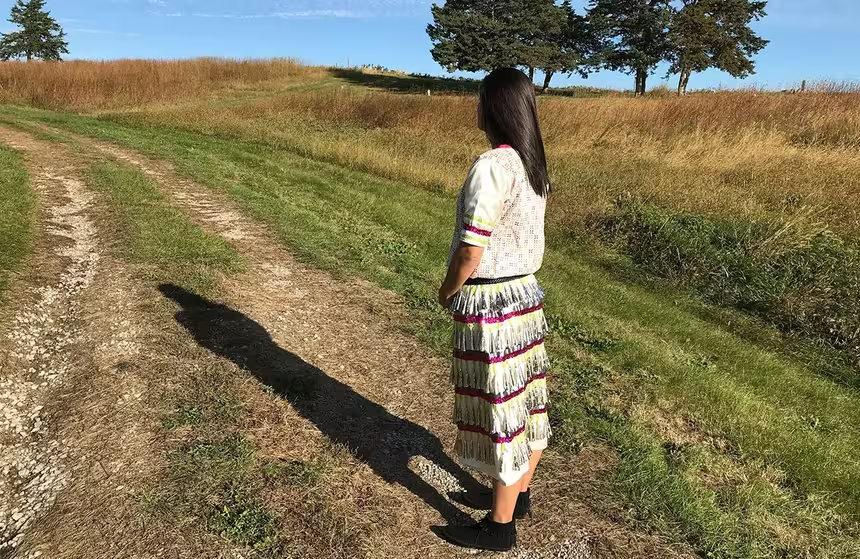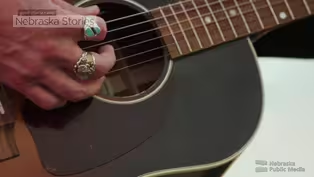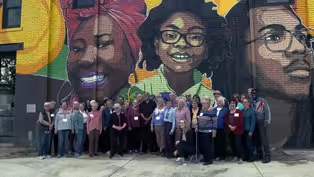
1407: The Relic Hunter
Clip: Season 14 Episode 7 | 7m 52sVideo has Closed Captions
Dig into Oregon Trail history with a man who spent his life near it.
Pete Peters was a young boy when he first visited an old trail outpost called Alkali Station, a stopping point on the Oregon Trail. Though it was a grassy pasture the day Pete first saw it, wagon ruts and the outline of the old post remained visible as they still are today. Living along the historic route, Pete amassed a collection of old bottles, weapons, arrowheads, and other things left behind
Problems playing video? | Closed Captioning Feedback
Problems playing video? | Closed Captioning Feedback
Nebraska Stories is a local public television program presented by Nebraska Public Media

1407: The Relic Hunter
Clip: Season 14 Episode 7 | 7m 52sVideo has Closed Captions
Pete Peters was a young boy when he first visited an old trail outpost called Alkali Station, a stopping point on the Oregon Trail. Though it was a grassy pasture the day Pete first saw it, wagon ruts and the outline of the old post remained visible as they still are today. Living along the historic route, Pete amassed a collection of old bottles, weapons, arrowheads, and other things left behind
Problems playing video? | Closed Captioning Feedback
How to Watch Nebraska Stories
Nebraska Stories is available to stream on pbs.org and the free PBS App, available on iPhone, Apple TV, Android TV, Android smartphones, Amazon Fire TV, Amazon Fire Tablet, Roku, Samsung Smart TV, and Vizio.

Do you have a Nebraska Story?
Do you have a story that you think should be told on Nebraska Stories? Send an email with your story idea, your name, your city and an email address and/or phone number to nebraskastories@nebraskapublicmedia.org. Or, click the link below and submit your information on nebraskastories.org.Providing Support for PBS.org
Learn Moreabout PBS online sponsorship(soft guitar music) (soft guitar music) (soft guitar music) (soft guitar music) (soft guitar music) [Pete] When you started in the morning, you could probably see where you're gonna stop at night.
I would say if they made 10 miles would be a real big day, I would bet.
(soft guitar music) (soft guitar music) You see a lot of depressions out here on along the Oregon Trail, you know?
And I never did dig one but I think what happened is these covered wagon trains they had to stick together for protection.
If they had like 40 wagons, the military would send a company to accompany 'em.
And if somebody passed away during the night I think they would, the ground was hard, you know, I think they'd dig a shallow grave.
Just big enough to get 'em in and cover 'em up.
And they had to be ready to go by morning.
And I'm sure within two nights, the coyotes, badgers wolves, dug them up, you know?
'Cause you see the depressions but you never see anything that's very deep.
And I bet they didn't bury 'em very deep.
And think of how hard they had been to leave one of your loved ones.
(gentle music) (gentle music) (gentle music) (gentle music) (gentle music) [Pete] The interstate ruined a lot of it, and it's too bad.
But down east here, when they were surveying it, I went down there and the trails were real obvious.
Deep and everything, and then I told the guys, I said, "You realize that you're ruining the Oregon trail?"
And they said, "Well, we'll just put a sign that says you're traveling on the Oregon Trail."
(gentle music) (gentle music) (gentle music) (gentle music) [Pete] He said this was a ranch, which they called 'em.
And he never did say if that's the one he had worked at.
But dad always said, he said he came here and worked on a ranch and there were no cattle ranches.
So I assume it would've been on the Oregon Trail.
And he took us down and I remember walking around and seeing stuff.
You know, as a matter of fact, I picked up an arrowhead and then on, of course, I just loved the place.
(chuckling) And that was that terrible depressive blowout country in the thirties.
And I remember him taking his folks down to see his brother.
They lived in a sod house and they had just built on an addition of sod and it was still wet.
And anyway, I can remember the, everything was blowing and they told me to go out and look around.
And I think when the day was done we had like 40 arrowheads we'd picked up.
And I just remember they gave 'em all to me.
So, that was my first big start.
(gentle music) (gentle music) [Pete] In the early fifties it was so dry and it blew so much.
And at that time we didn't have the pivot irrigation.
And it had a tendency, of course, over winter to blow.
And those hilltops, it blew down to hard ground.
And gosh, all you had to do was walk out there and that's about all there was, was flint.
And it was easy to find an arrowhead.
Now it's not.
(drawer scratching) (drawer scratching) Well it's a Remington new model, which was popular in the Civil War period.
This particular one was lost along the Oregon Trail apparently, or possibly the owner was shot or whatever.
But it's fully loaded.
All of the cylinders still have their balls in 'em.
So, how it happened to be there, I don't know.
But anyway, that's where it was found.
And it's along the Oregon Trail.
(gentle music) [Pete] I think the most fun I had though, was probably digging bottles out of the old forts.
I just loved those old bottles.
Bitters, which is whiskey, they didn't like to call it whiskey, but it's what it was.
It was an age of alcohol.
(chuckling) They drank a lot of it.
We used to dig the crock ones.
They were too toned and they were ale.
And they must have lived off of that stuff because they were everywhere.
And I got to where I didn't even pick 'em up, I didn't like 'em because they'd throw 'em in the pit and break the good ones.
And there's some more of the old bottle.
That's the ale that I was telling you broke all the other bottles, pretty common.
I remember going to Wallace one time, the fort, couldn't find anything and it was getting late in the day, and I was starting to come home and the old town it was a trading post to Wallace and nothing left to it, just flat ground.
And I had my spade and I took a spade full out and hit a bottle, the first thing, you know?
And that little thing was hacked full of bidders bottles.
One of the best pits I ever hit and yet it wasn't three foot square and three foot deep probably.
But you never knew what you were gonna find.
(gentle music) It was beautiful morning and we went up there and she... we took the two kids and I looked around and pretty soon I found a depression, a pit.
(gentle music) And she put the baby or the blanket down on the grass and I started digging.
And I hit a bottle pit and I dug bottles.
(gentle music) And I told her a while back, I said you know, (gentle music) that's probably the best day of my life.
Probably the most pleasant day that I ever spent.
(gentle music) Oh, I can just sit there and just picture the covered wagons going by and all that stuff, you know?
It's just a calming place to go, for me anyway.
I hope the old Oregon trails there many many generations after I'm gone, (gentle music) I hope they make provisions that it's not to be destroyed, you know?
Now, I don't think there is anything if they wanted to build a highway over it, I think they could.
But I think it should be preserved.
(soft music) (soft music) (soft music) (soft music)
1407: Lloyd McCarter & The Honky-Tonk Revival
Video has Closed Captions
Clip: S14 Ep7 | 5m 40s | Lloyd McCarter & The Honky-Tonk Revival share their take on old-time country. (5m 40s)
Video has Closed Captions
Clip: S14 Ep7 | 8m 3s | A guided tour of North Omaha's rich past as it looks to its future (8m 3s)
Providing Support for PBS.org
Learn Moreabout PBS online sponsorshipSupport for PBS provided by:
Nebraska Stories is a local public television program presented by Nebraska Public Media

















